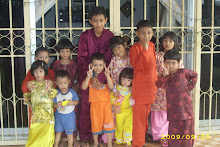On looking back, I must readily admit how kind life had been to my contemporaries and I in our schooldays. At the risk of being branded a misplaced romantic may I be allowed space to plead my case?
Parental and peer pressure in our pursuit of that much sought-after Cambridge School Certificate was not totally absent. It was minimal though. Not enough to drive the desperate to tragic consequences like what we have been hearing of late, anyway. We took things as they came, not too leisurely, though, for failure had its grounding effect too.
While in form four, my friends and I formed a small study group which we hoped could help safely see us through the-all important examination at the end of our school years. English and Mathematics were subjects we were asked to "pay special attention to" though the significance of the other disciplines were never belittled.
Tuition centres were as yet unknown. Out teacher occasionally held extra classes especially for the "slow coaches", as one enlightened teacher labelled us. He meant well of course and though attendance was voluntary, we had full classes almost always. Seeing such dedication, could we not just reciprocate by turning up on any Friday or Saturday? I am not being redundant here by saying that our teachers provided voluntary service when tuition classes or centres sprouting up uncontrollably nowadays were light years away from incubation.
I was once down with flu or mumps and had to be away from school for two weeks, one in hospital. Hospitals those days were crying for "guests" and a schoolboy would be gladly welcomed to the second class ward. To many, this place was taboo (suay) as some said since it was always associated with death and decay.
Upon returning to class, my Mathematics teacher informed me that I was two weeks behind and was to report to his place daily every afternoon till he was happy with my performance. I did dutifully. Complimentary tea came with the personal tuition. Talk about a noble profession now!
In our class, examination guide books floated around freely, courtesy of some well-heeled towkay's understanding offsprings. The "ten-years' series" was the much-sought after publication then. They were past-years' questions with the suggested answers, I think.
As far as I could remember the school saw a hub of activities almost all year round. The first term brought us to the football field. The second was mainly affiliated to athletics and the third rugby and hockey.
We gladly turned up for the activities, those of the uniformed units were given due weightage too. Some debated were held in the school hall during the nights as were inter-school badminton matches.
My years in the Government English School Kluang, later named the Secondary English School, enabled me to quite easily pick out the sportsman from the military cadet or any member of any uniformed unit or even the school debater who could mesmerize the audience with their fiery rhetoric. The Bard's plays were acted out and they helped in our preparation for the English Literature paper in our final year.
The school certificate as some would prefer to refer to it, opened doors to Form Six, the Technical or Agricultural College, Teacher's colleges, RIDA or later MARA college, and for the loaded, medical colleges, local or abroad. The hurdle was that all-important-ship awarded by the feared Syndicate. This word conjured visions of some secretive and dubious dealings which to my interpretation then must have been made in some dark dark cells in a medieval castle in faraway Cambridge.
Anyway, nearer home ground, as proven by some seniors, the least were some government positions as clerks, technicians, or such similar jobs. The Vespas or Lambrettas whizzing by in the otherwise sleepy hollow (according to one city slick) or the trustworthy Morris Minor marked one's position accordingly.
Workouts? Yes, we had our fair share of them. Many, including the teachers, simply walked to school. Some of our top sportsmen excelled academically too and ended as doctors, engineers or army officers. The "padangs" were one open gymnasiums and rarely did we hear of schoolmates succumbing to physical pursuits.
Save for those who left for one reason or other, my class of Form Two of '56 remained as a cohesive unit right up till the end of our schooldays. It was school life as it should be with debates and excursions, sketches and plays culminating with the staging of Julius Caeser one glittering night.
While in Form Four our ascent of Gunung Lambak not long after the jungle-covered highland was declared a "white area" (free from communist threat) must surely be fondly remembered by our class members for a long time. The anti-climax was to discover that there were evidence of earlier civilization beating us to any claim to fame whatsoever.
Should one ask about this reminiscing of early innocence, the answer is that there can still be success without the excessive fear of being a total failure. It had been proven.
Thursday, June 11, 2009
Subscribe to:
Comments (Atom)
